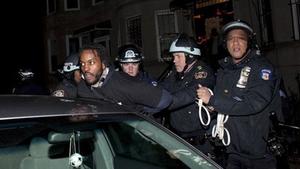Law enforcementFederal judge: NYPD stop-and-frisk policy violates 4th, 14th Amendments (updated)
In a scathing, 195-page decision, a federal judge repudiated one of the major pillars of Mayor Michael Bloomberg’s crime-fighting strategy, finding that the NYPD’s stop-and-frisk tactics violated the constitutional rights of minorities in New York. The NYPD stopped some 4.43 million between 2004 and mid-2012, with Blacks and Hispanics accounting for 88 percent of those stopped. The NYPD has explained the disparity by saying that it mirrored the disproportionate percentage of crimes committed by young minority men. Judge Shira A. Scheindlin, using harsh language, dismissed this rationale. “This might be a valid comparison if the people stopped were criminals,” Judge Scheindlin wrote, explaining that there was significant evidence that the people being stopped were not criminals. “To the contrary, nearly 90 percent of the people stopped are released without the officer finding any basis for a summons or arrest.” Rather, Judge Scheindlin found, the city had a “policy of targeting expressly identified racial groups for stops in general.” She added: “Targeting young black and Hispanic men for stops based on the alleged criminal conduct of other young black or Hispanic men violates bedrock principles of equality.” The judge ruled that the effectiveness of “stop and frisk” was irrelevant. “Many police practices may be useful for fighting crime — preventive detention or coerced confessions, for example — but because they are unconstitutional, they cannot be used, no matter how effective,” the ruling said.

A federal judge has accused New York City of "indirect racial profiling" // Source: juventudrebelde.cu
In a scathing, 195-page decision, a federal judge repudiated one of the major pillars of Mayor Michael Bloomberg’s crime-fighting strategy, finding that the NYPD’s stop-and-frisk tactics violated the constitutional rights of minorities in New York.
The judge called for a federal monitor to supervise the fundamental reform of police tactics.
Judge Shira A. Scheindlin, in a decision issued today (Monday), found that the NYPD had “adopted a policy of indirect racial profiling” that targeted young minority men for stops. Bloomberg said the city would appeal the ruling. The mayor, after offering a long list of what he described as the benefits of the stop-and-frisk policy, bitterly accused the judge of not giving the city “a fair trial.”
In her ruling, Judge Scheindlin found that in doing implementing the policy, the police systematically stopped innocent people in the street without any objective reason to suspect them of wrongdoing.
The stops, which dramatically increased in number as crime continued to decline during the past ten years, demonstrated a widespread disregard for the 4th Amendment, which protects against unreasonable searches and seizures by the government, as well as the 14th Amendment’s equal protection clause, the judge said.
The New York Times reports that Judge Scheindlin’s criticism went beyond the conduct of police officers. The judge, holding the city liable for a series of constitutional violations, found that top police officials acted with deliberate indifference. She said that police commanders were content to dismiss allegations of racial profiling as “a myth created by the media.”
Citing statements by the mayor and Police Commissioner Raymond Kelly, Judge Scheindlin accused the city of using stop-and-frisk as a checkpoint-style policing tactic, with the intent of deterring minorities from carrying guns on the street.
“I also conclude that the city’s highest officials have turned a blind eye to the evidence that officers are conducting stops in a racially discriminatory manner,” she wrote.
“No one should live in fear of being stopped whenever he leaves his home to go about the activities of daily life,” Scheindlin wrote in her opinion.
The judge designated an outside lawyer, Peter Zimroth, to monitor the NYPD’s compliance with the Constitution.
Judge Scheindlin ordered a number of other remedies, among them:
· A pilot program in which officers in at least five precincts across the city will wear body-worn cameras in an effort to record street encounters
· A “joint remedial process” — in essence, a series of community meetings — to solicit public input
